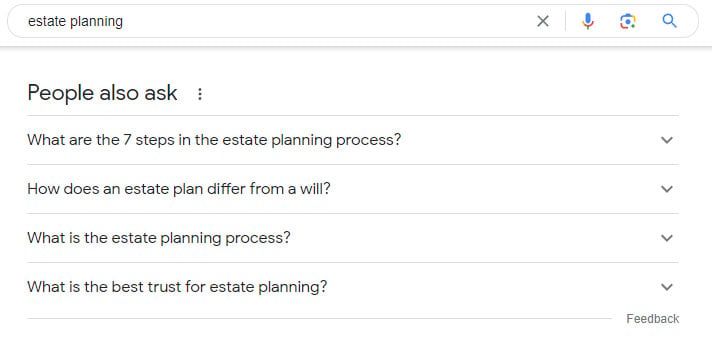If you're a lawyer looking to boost your online presence through awesome content, you're in the right place. I'm here to guide you on creating standout content for your website, with a focus on your specific practice areas and engaging blogs. This is your chance to impress potential clients, and Google, and show them you know your stuff.
We know a thing or 2 about attorney websites, we've made a whole bunch. Check out our web design portfolio where you can check them out.
Building Trust and Relatability Through Your Website Content
Whether you're designing your practice area pages or crafting your next blog post, remember this golden rule of marketing: people buy from people they know, like, and trust. The goal of your website content is twofold: to gain SEO exposure, yes, but more importantly, to win over potential clients by building trust and making your brand relatable. So, how can you do this through your words and images?
Words that Build Trust and Relatability
The words you use on your website can have a powerful impact on how potential clients perceive you. It's not just about providing information; it's about doing it in a way that resonates with your audience.
Make sure your content speaks to your audience in a language they understand. This means avoiding overly complex legal jargon and explaining things in plain English. Your potential clients are likely already stressed about their legal issues; don't add to their worries with hard-to-understand language.
Example:
Legal Jargon: "Pursuant to Rule 1028(c) of the Pennsylvania Rules of Civil Procedure, a preliminary objection to a complaint can be overruled if the matter constituting the basis for the objection is more appropriately addressed at trial."
Plain English: "Under Pennsylvania law, if someone objects to a complaint early on, the judge can decide to ignore it if they think it would be better dealt with during the actual trial."
And don't shy away from showing some personality in your writing. This doesn't mean sacrificing professionalism; it's about striking a balance between being an expert and being human. Show your audience that behind the attorney is a person who understands their fears, their struggles, and their hopes.
Images that Enhance Trust and Relatability
A picture is worth a thousand words, as they say. The images on your website should not only be high-quality, but they should also complement your words in building trust and making your brand relatable.
Consider featuring images of your team, your office, or you at work. This gives potential clients a glimpse into your world and helps them feel more connected to you. If you can, use images that reflect the local community or landmarks, to emphasize your firm's local expertise and commitment.
I find this always always helps - use images that evoke the feelings or results you want your clients to associate with your services. For instance, if you're a family lawyer, images of happy families can subtly convey the peace of mind and resolution you can bring to your clients.
Every piece of content on your website should serve a dual purpose: to boost your visibility on search engines and to build trust and relatability with potential clients.
Understanding your Target Audience
Knowing your audience is crucial in shaping your website's content. It's all about understanding who they are, what they're worried about, what questions they have, and how you, as a legal expert, can help them.
- Pay attention to the questions your clients frequently ask you. These questions are pure gold – they're exactly what your potential clients want to know. So why not use them as inspiration for your blog content? If you’re often asked about the divorce process, write a blog post titled "Understanding the Divorce Process: A Step-By-Step Guide".

Google's "People also ask" section is a fantastic place to find common questions people have about a particular legal topic. Simply type a general legal term into Google and see what questions pop up. Let's say you type in "estate planning". You might find questions like "What is included in estate planning?" or "Why is estate planning important?". Write about those!- Don't be afraid to keep an eye on what other successful legal websites are doing. While you should never copy content, looking at popular topics in your practice areas can help spark ideas and identify what potential clients are interested in.
Creating Engaging Blog Content
Remember those common questions your clients are always asking? Or the ones you see when you go on a Google search spree in the "People also ask" section? Yes, those ones. Those questions are like gold nuggets of content ideas. Each one has the potential to be a smashing blog post that’s not only useful to your audience but shows off your legal prowess.
Say you're a personal injury lawyer and you get asked, "What should I do after a car accident?" all the time. Well, there you go - that's a prime candidate for a great blog post.
Start with an intro that grabs your readers' attention. Highlight the question your blog post is going to tackle and why it's crucial they know the answer.
Next, let's break that answer down into bite-sized, easy-to-digest pieces. Write about your experience dealing with this area of law – no need to boast, but it's okay to let them know you've been around the block a few times. Discuss important local laws they should know about. Finally, and this is the big one, tell them how you can help.
Remember to write in plain English and keep it fun. You're not in court, you're on your website, so you can loosen up a bit.
And when you're wrapping up, make sure to include a neat little conclusion that ties everything together. Invite your readers to leave a comment or ask a question. You never know, their responses might just spark the idea for your next blog post.
Now onto the technical part. To add a blog to your WordPress website, head to your WordPress dashboard, find the 'Posts' tab on the left, and click 'Add New'. Voila! You've got a blank canvas to start crafting your blog post. When you're done, hit the 'Publish' button on the right, and your blog post is live!
Developing Effective Practice Area Pages
Let's move onto one of the most critical parts of an attorney's website - the practice area pages. These pages are key to showcasing your expertise in specific areas of law and making it easier for potential clients to find the information they need. Here's how to structure them and what content to include, keeping in mind the need for unique content and SEO considerations.
The Ideal Structure for Practice Area Pages

Start with a main services or practice areas page. This is an overview of all the areas of law you specialize in. Each practice area listed should link to a dedicated page for that area.
For example, if you're a family lawyer who also handles personal injury and estate planning cases, your main practice areas page should list and briefly describe these areas, with each one linking to a dedicated page. This not only helps your visitors navigate your website more easily, it also gives you more opportunities to rank in search results for these specific areas of law.
What to Include on Each Practice Area Page
Now, let's talk about the content on each practice area page. Each page should highlight your experience in the specific area, provide important local legal information, and explain how you can help potential clients.
For instance, on your family law page, you could mention the number of divorce cases you've handled, discuss how divorce laws work in your state, and outline the support you provide to clients going through a divorce. Remember to keep your language straightforward and relatable.
Unique Content for Each Practice Area Page
This is important: each practice area page must have unique content. Copy-pasting content across different pages is a big no-no. Not only does it not provide a good user experience, but it also doesn't sit well with search engines. You want to create original, valuable content for each page to increase your chances of ranking well in search results.
Targeting Different Areas for SEO
If your firm operates in different locations, it's a good idea to have practice area pages for each location. You could, in theory, simply swap out location names in the content, but I highly recommend writing unique content for each location.
This not only improves the user experience but also sends positive signals to search engines. It shows that you've put time and effort into creating valuable content for each specific audience, which could boost your rankings in local search results.
Legal Content and Ethical Considerations
While creating your website content, it's crucial to remember to be accurate and ethical. Your content should be reliable, professional, and clear, without crossing any professional boundaries or promising outcomes. You need to make sure your audience understands your content is for informational purposes and doesn't replace legal advice. It’s common practice to include a disclaimer that specifically states that everything on the site is informational only. This approach maintains your professionalism and helps build trust with your potential clients.



